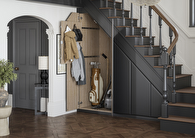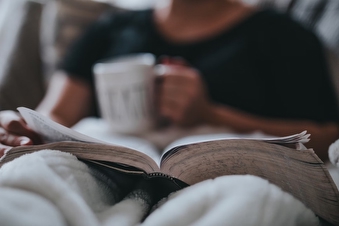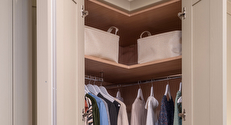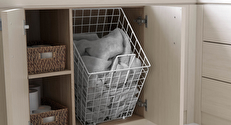
Five ways to reclaim unused space in older properties
Older properties are full of character, from high ceilings to unconventional layouts, but these features can also make furnishing and organising tricky.


Here at Hammonds, we know that with all the stresses of modern life, creating a relaxing space in your bedroom is important for getting a good night’s sleep.
To find out what keeps the nation up at night, we surveyed 2,000 UK-based adults on their sleeping habits, shining a spotlight on how long it takes them to fall asleep and which rituals they do before hitting the hay.
We've also teamed up with a sleep expert to explore which habits you should add to your new zen bedtime routine.
Why do Brits struggle to fall asleep at night?
General anxiety and overthinking is the most common worry, keeping the equivalent of nearly 20 million Brits awake at night.
Our data shows that anxiety and overthinking are a common problem across all age groups, peaking among 55–64-year-olds (51%). On the low end, a third of 25–34-year-olds are still affected by this (33%).
The top 10 reasons for struggling to fall asleep in the last month:
Furthermore, our survey also reveals that a messy room prevents over 3 million Brits from falling asleep, with 6% selecting ‘too much clutter’ as a reason.
How long do people take to fall asleep
Our survey reveals that the average Brit falls asleep in just over half an hour (38 minutes), while most Brits take 5-30 minutes to fall asleep (53%).
However, worryingly over 6 million (11%) say they take longer than one hour to fall asleep. Of those, 4.6 million (9%) say it takes 1-2 hours, just over 1 million (2%) say it takes 3-4 hours, and over 500,000 (1%) even say they take longer than 4 hours to fall asleep.
On average, 65+ year olds fall asleep the fastest (31 minutes), while 18-24-year-olds take the longest (48 minutes).
What do Brits do to help them sleep better?
With over a quarter of Brits (27%) saying their sleep has got worse in the past year, what can people do to get a better night's kip?
These are the most effective activities to get to sleep quicker, according to our survey:
Activity - % of respondents who find this effective
Our survey reveals that there are some unexplored options to try, too. Nearly half of Brits say they never tried meditating to fall asleep faster (48%). Wearing an eye mask (45%) or putting in ear plugs (45%) also haven’t been tried by many yet.
Additionally, over 2 in 5 (43% or over 21 million) have never tried tidying the room before going to bed. This is despite over 3 million Brits (6%) feeling that too much clutter / a messy room prevents them from falling sleep.
What do the experts say about creating a better sleep environment?
To help sleepy Brits doze off at night, we put the following questions to sleep expert Olivia Arezzolo from Mute Snoring:
What is sleep hygiene?
“Behavioural and environmental practices that support healthier sleep. Behaviours include reducing screen time in the evening, taking a shower, and, if snoring, using a nasal dilator to minimise it. Environmental practices include keeping a cool bedroom temperature and sleeping on a comfortable mattress.”
Why is sleep hygiene important?
“It helps us fall and stay asleep, and get deeper, more rejuvenating rest.”
How does sleep hygiene affect daily life?
“Immensely! Consider the ill effects of insufficient and poor-quality sleep, which can occur if we are NOT practicing good sleep hygiene. Such as:
Physical issues, such as fatigue:
70% of Human growth hormone, the key catalyst for cellular repair and recovery, is produced in slow wave sleep. If we don't get sufficient sleep, we compromise this process, which leaves us feeling fatigued, exhausted, and more likely to get sick.
Cognitive issues, such as memory loss:
During deep sleep, our brains detoxify from beta amyloid, a neurotoxin to contribute to brain fog, memory loss, and even Alzheimers disease. And, if we don't sleep enough, we impair this process, which is exactly why we struggle to focus, concentrate and remember facts accurately after a bad night's sleep.
Mental health issues, such as anxiety:
With insufficient sleep, cortisol, our stress hormone, can increase by 37% - leaving us anxious, wired and unable to switch off.”
What are your tips for good sleep hygiene?
“Behaviours include reducing screen time in the evening, taking a shower, and, if snoring, use a nasal dilator minimise it. Environmental practices include keeping a cool bedroom temperature and sleeping on a comfortable mattress.”
How might you create an optimal environment for sleep?
“Have a screen free zone, keep a cool temperature, comfortable bed, sheets with thread count between 200 and 400.”
What would you recommend in relation to setting a sleep schedule?
“I recommend setting a sleep schedule to ensure 7-9 hours of sleep, depending on your needs and personal preferences.”
Too much clutter makes falling asleep harder for millions
Our survey shows that there are many reasons why Brits fail to fall asleep as quickly as they would like at night.
In fact, too much clutter and a messy bedroom prevents millions of people from switching off in the last month.
Visible mess signifies chaos and unfinished chores, so a restful bedroom space should be clutter-free and minimal to ensure your mind remains clear too.
Fitted bedroom storage can be a great idea to ensure no inch of space is wasted, with bespoke storage suited to the dimensions of your room.
Sources & Methodology

Older properties are full of character, from high ceilings to unconventional layouts, but these features can also make furnishing and organising tricky.

Attics are often treated as overflow storage.

Starting your day in a calm, organised bedroom helps everything else fall into place.
Whether you have an exact vision in tow, or are just at the beginning stage of your home renovation, we have heaps of inspiration for you to get stuck into.
Find a wealth of design tips, trends and inspiration in the pages of our brochure, magazine and on our blog. Our experts are always ready to help you create dream home, pop in store or book your free design visit for experts to help on bringing your vision to life.